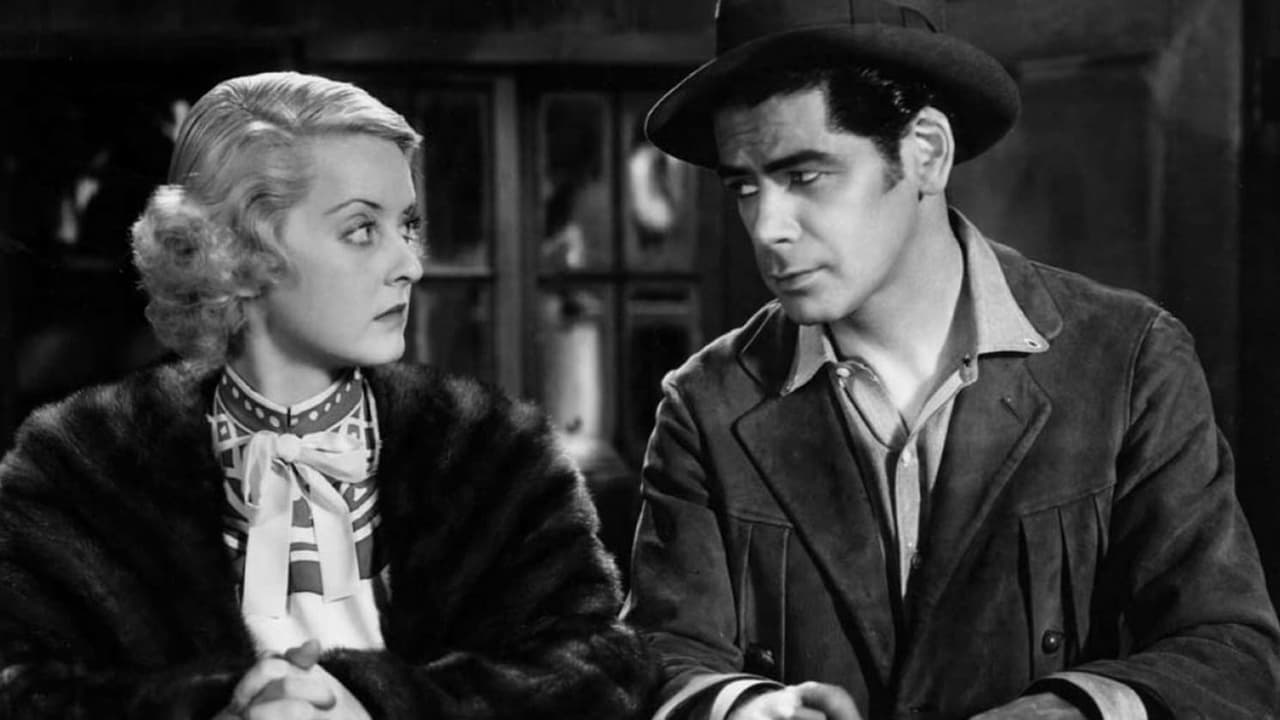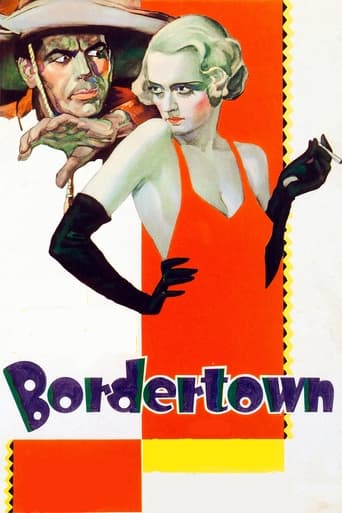



Wonderful character development!
I think this is a new genre that they're all sort of working their way through it and haven't got all the kinks worked out yet but it's a genre that works for me.
View MoreThis movie feels like it was made purely to piss off people who want good shows
View MoreThere's no way I can possibly love it entirely but I just think its ridiculously bad, but enjoyable at the same time.
View MoreBORDERTOWN (Warner Brothers, 1935), directed by Archie Mayo, stars Paul Muni in one of his many ethnic characterizations for which he is famous. Best known for his Italian accented SCARFACE (1932), followed by his latter biographical passages as both French Louis Pasteur and Emile Zola, along with the Chinese Wang in THE GOOD EARTH (1937), Muni attempts one that of a Mexican who breaks away from his people to make something of himself outside his jurisdiction. As much as BORDERTOWN virtually belongs to Muni during its entire 90 minutes, the movie overall is noted more as a Bette Davis film shortly before her achieving super stardom by 1937. Even though Davis' character comes late into the story (35 minutes from its start), she makes the most out of her character enough to gather the most attention. Johnny Farada Ramirez (Paul Muni), is a young Hispanic man living with his people in the Mexican quarter of Los Angeles, California. Labeled "THE tough guy of a tough neighborhood," Johnny has made something of himself by studying five years at the Pacific Night Law School, and graduating with other would-be lawyers of all ethnic background. With a diploma in hand, as witnessed by his aged mother (Soledad Jimenez) and close friend, a priest, better known as Padre (Robert Barrat). Johnny abandons his garage mechanical job and opens a law office of his own. After leaving the Café La Paloma with her escort and lawyer friend, Brook Mandigan (Gavin Gordon), socialite Dale Elwell (Margaret Lindsay) drives off in high speed down the road, crashing into the truck driven by Johnny's poor friend, Miguel Diego (Arthur Stone). For his very first courtroom case, Johnny poorly constructs himself, losing his case for Miguel, as told to him in the chambers of the Judge (Samuel S. Hinds). After being called a shyster lawyer by Mandigan, Johnny loses his temper by striking Dale's acting attorney. His savage actions find Johnny disbarred. Feeling Mandigan and Dale won their case because they have money, Johnny's goal now to leave home, make something of himself and earning enough money for himself to become respected. A year later, the once down-and-out Johnny Ramirez has now risen from ballroom bouncer to adviser and partner to Charlie Roark (Eugene Pallette), owner of a gambling casino, The Silver Slipper. Knowing his full worth, Johnny wants and gets his 25 percent interest in Roark's business, thanks to Roark's young and attractive wife, Marie (Bette Davis), who happens to be much more interested in Johnny than her middle-aged, fat businessman husband. Because Marie's married to his friend, Johnny respects Charlie and stays away from his wife. After Charlie meets with an accidental death, Johnny inherits Roark's business and renames it La Rueda Casino. While the business is successful, Marie demands more than money. When she discovers Johnny has been seeing Dale Elwell, who's come back into his life to be with her "savage," Marie stops at nothing to break up their relationship. Other members in the cast include familiar Warner Brothers stock players as William B. Davidson (Doctor Carter, the dentist); Hobart Cavanaugh (Howie); and Henry O'Neill (J. Elwell Benson). Look for Arthur Treacher (Roberts, the Butler) and Akim Tamiroff in uncredited roles. If some of the plot sounds familiar, certain scenes were revamped into a trucking story titled THEY DRIVE BY NIGHT (Warner Brothers, 1940) starring George Raft, Ann Sheridan, Ida Lupino and Humphrey Bogart. Raft assumes the Muni part as the ambitious trucker while Alan Hale plays the Pallette part of boss and business partner, but it's Ida Lupino who comes off best reprising Davis' impulsive Marie. While Lupino's performance was easily a standout, her performance is over the top acting as opposed to Davis doing very much the same but in a better and more natural style. For BORDERTOWN, Davis shows her early ability to become a good dramatic actress, especially during the courtroom scene where her method of going insane is different and better constructed than Lupino's. Though the role of the ambitious Mexican Johnny could have been played by a Hispanic-born actor as Gilbert Roland for example, it's the better known Paul Muni, in darker hairstyle and Spanish accent, who becomes more Mexican by being as opposed to playing a Mexican. Though noted for not being one to be type-cast by playing the same role twice, Muni played a Mexican once more, this time as a historical figure of JUAREZ (1939). Though Bette Davis became Muni's co-star once again, she and Muni shared no scenes together in what would have been their second (and final) collaboration. BORDERTOWN is nearly a forgotten melodrama known for its early screen depiction of racial prejudice among Hispanic-Americans, and a Mexican's uneasy struggle for equality with the outside world. It's not only available on DVD, but can be seen from time to time on cable television's Turner Classic Movies. (*** jumping beans)
View MoreThis is a variation and predecessor of "They Drive By Night", and it periodically airs on Turner Classic Movies and seems to be in good condition. That's important because this film is on DVD-R via the Warner Archive and has had absolutely no restoration done to it - whatever happened to be in the Warner vault is what you get. I just thought I'd mention that in case you decide to purchase it - there is no other way to own it.This film is not an introduction to Bette Davis. She had first worked at Universal and then switched over to Warner Brothers in 1931 where she starred opposite George Arliss in "The Man Who Played God". Universal thought she didn't have any potential. Bette Davis is still playing a largely supporting role here. Paul Muni is the actual star as a Latino man with big dreams (Johnny Ramirez) as he finally graduates from night school with a law degree. However, his first case finds him totally unprepared to the point of malpractice. Next he loses his temper and punches the opposing attorney in the nose. The judge recommends that he be disbarred, and our hero's short law career is over. A disheartened Johnny wanders down to a border town where he becomes friends with Charlie Roark (Eugene Palette), and soon becomes partners with him in a casino there. Bette Davis plays Roark's wife who secretly loves Johnny. She thinks the only thing coming between her and Johnny is her marriage, so she leaves her drunken husband in the garage one night with the car running, making his death look like an accident to the authorities. However, Johnny really loves a society girl, and this drives Roark's widow to even more desperate measures.Muni's last lines in the film and the apparent moral to the story will have modern audiences probably saying "What the...", but you have to remember this was made in 1935 and appreciate it for the performances.
View MoreFormer crook Juan 'Johnny' Ramirez (Paul Muni) manages to work himself out of his Hispanic slum and become a lawyer. Encouraged by his mother, he sets up his own office and faces his first court case after wealthy socialite Dale Elwell (Margaret Lindsay) crashes her car into the cart of one of Johnny's poor neighbourhood friends. Crushed and embarrassed by Dale's white, costly lawyer Brooke Manville (Gavin Gordon), Johnny attacks him, getting himself disbarred. Vowing to make something of himself in the world, Johnny hitches a ride over the Mexican border, becoming a bouncer and adviser for club owner Charles Roark (Eugene Palette), eventually earning himself a partnership through his wits and business know-how. But Roarke's bored wife Marie (Bette Davis) has other ideas and sets her sights on running her own club, and seducing Johnny to her cause.This Warner Brothers vehicle for star Paul Muni uses racial stereotypes - of which would be highly condemned nowadays - to portray a damning indictment of the American system and the idea of 'The American Dream'. When Muni is humiliated in court by Manville, he resorts to his fists, something that ethnic minorities back in 1935 no doubt had to do to survive in their slums. It is common knowledge that America, self- declared land of the free, has a brutal history of racial oppression, and Bordertown is impressive in its bravery to tackle a subject when the Hollywood system itself was guilty of neglecting black or ethnic actors. It also dawns on Johnny that America is ultimately ruled by money, and if you rely on honesty and simply doing the right thing, you'll ultimately left licking the shoes of the rich man.Yet for all it's promise, Bordertown is ultimately rather dull. Muni, one of the finest actors of his generation (and an actor now unfairly left in the shadows of the likes of Cagney and Bogart), is thoroughly unconvincing as Johnny, wildly over-acting and never looking comfortable in make-up and with a dodgy accent (Muni was Jewish). Davis, however, is a revelation in what is perhaps a smaller role than the poster and billing would suggest, puffing smoke through her nostrils like a dragon in one of her early scenes, embodying the icon she would later become. But Bordertown tends to shuffle along aimlessly, passing over a late plot development and fizzling out into nothing, arriving far too late in the day for me to really care.www.the-wrath-of-blog.blogspot.com
View MoreTwo films that Bette Davis and Paul Muni did together evolved around Spanish heritage-this one and 1939's "Juarez."When I saw this film, I began to think of "They Drive By Night," which came several years later and had Ida Lupino and Humphrey Bogard in similar roles where a spurned Lupino, who had killed her husband in the same way that Davis did in the Eugene Palette character, goes berserk when Bogart ignores her.Lupino's outburst in the court that the doors made her do it was much more effective than Davis's insanity scene.Nonetheless, we have an excellent film here with the element of class identity and racism added to the mix.Muni as Johnny Ramirez is perfect. He desires the American dream, but even a law degree can't save him from a poor performance in court, a terrible temper which will lead to his expulsion from practicing the law. Ramirez finds success another way, by opening a nightclub after he formed a partnership with Palette and met Palette's bored, lust filled Davis.In a supporting performance, Margaret Lindsay is effective as the high class society spoiled woman who turned the tables on attorney Ramirez in court, only to meet him some time later, when he is a success, but only to reject him again.Remember Rita Moreno's statement in "West Side Story?" Stick to your own kind, stay with your own kind. Ramirez repeats this at the end of the film. 1935 or 1961, this was the prevailing time of racism.
View More